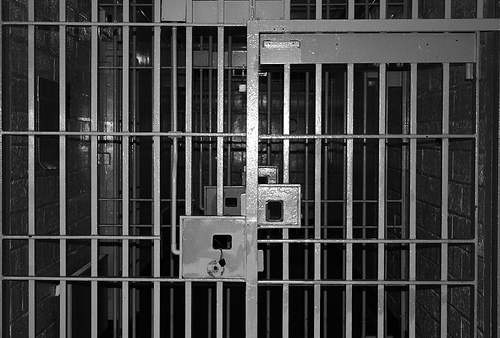
Photo courtesy of Still Burning / Flickr
WASHINGTON – The U.S. Department of Justice has come under intense criticism for not requiring states to conduct rigorous audits of correctional facilities under the Prison Rape Elimination Act.
Instead of requiring the audits, the department is allowing states to provide written assurances they will spend DOJ funds to make progress toward compliance with PREA standards though they have not yet complied with them.
“This is very alarming. The lack of audits presupposes that non-compliance with the standards is no harm, no foul,” said Brenda V. Smith, who served on the National Prison Rape Elimination Commission from 2003 through the 2009 completion of its work, in an e-mail to JJIE.
“What we know, though, is that every day people in custody are experiencing sexual abuse and victimization,” she said.
Smith said DOJ officials had previously denied that the states’ written assurances would make the facility audits unnecessary.
But at a PREA “teach-in” Monday at the American University Washington School of Law in Washington, Smith said, a DOJ official acknowledged publicly that the assurances would, in fact, make it unnecessary for states to comply with the audit requirement, which had been included in the final PREA standards, published in 2012.
They stipulated that the rigorous audits be conducted annually, with a third of each type of correctional facility audited in each of three years.
Smith’s concerns center on a little-known DOJ provision, made public on the department’s PREA Resource Center website, that states: "During the initial three-year [PREA] audit cycle, which ends on August 19, 2016, a governor may submit an Assurance without conducting any PREA audits. If necessary, additional guidance will be provided on whether the Department of Justice will continue to accept Assurances in the absence of PREA audits beyond the initial three-year audit cycle."
At the teach-in, the DOJ official, Ruby Qazilbash, associate deputy director for Justice Systems Policy at the department’s Bureau of Justice Assistance, said states and territories would be required to submit annually either certification of PREA compliance or an assurance that they would use a portion of Justice Department funds to work toward compliance.
“I think there was some misunderstanding that the department was giving states a pass for three years,” Qazilbash told about 50 people at the teach-in, a podcast of which is available online.
But Smith, a professor at American’s law school and project director of its Project on Addressing Prison Rape, said that’s precisely what DOJ is doing.
“DOJ's soft-pedaling on audits and allowing assurances to be sufficient gives states and localities a pass to avoid the kind of oversight that could prevent abuse of people in custody,” Smith said. “This was not the commission's intent, and I am certain that it was not the [PREA] co-sponsors' intent either.”
Qazilbash also said: “We couldn’t say you need to be compliant with this [audit] standard over all of the others. If you’re not compliant with the audit standard, it doesn’t mean you are more or less compliant [with PREA standards]. It is one [PREA] standard you are not compliant with.”
Smith, who delivered opening and closing remarks at Monday’s teach-in and served as the moderator for one panel, took issue with that assertion.
“Even though the DOJ rep indicated that the audit standard was just one standard and not more important than the others, that strains credibility and belief,” she said.
“It is the standard that provides incentive for agencies to comply with the others. As [former U.S. Supreme Court] Justice Louis Brandeis said, ‘Sunshine is the best disinfectant.’ Audits are the sunshine in the [PREA] standards. They penetrate or have the potential to penetrate into the places where abuse can hide and fester. The lack of audits consigns abuse and its victims to the shadows.”
PREA, which was passed unanimously by Congress in 2003 and signed into law by President George W. Bush, requires DOJ to develop and publish standards to detect, prevent, reduce and punish sexual assault of people in custody. The final standards, published in 2012 after almost a decade of debate and discussion of details, require correctional facilities to improve surveillance and strengthen discipline, while making it easier for those in custody to report sexual abuse.
States that don’t comply with PREA standards are penalized with a loss of some Justice Department funds.
Thus far, only two states — New Jersey and New Hampshire — have certified PREA compliance, through letters from their respective governors, Republican Chris Christie and Democrat Maggie Hassan.
Forty-six states and territories have sent the Justice Department assurances that they intend to use a portion of DOJ funds to help them become PREA compliant and will not be penalized.
And eight states and territories — Arizona, Florida, Idaho, Indiana, Nebraska, the Northern Marianas Islands, Texas and Utah — have not provided certifications or assurances and will lose a portion of DOJ funding as a result, the department says.
In a May 14 letter to Attorney General Eric Holder, the National Governors’ Association pleaded for more time to implement the PREA standards.
“Despite the law’s enactment in 2003, [federal] delays in providing states the necessary guidance to evaluate and meet statutory and regulatory requirements have made compliance with proposed deadlines nearly impossible,” NGA Executive Director Dan Crippen wrote.
Governors, Crippen wrote, “applaud the intent and spirit of PREA, and are taking action to prevent sexual assault in state correctional facilities.”
But Crippen, expressing concerns over DOJ plans to “rigidly enforce” PREA compliance deadlines, wrote, “Governors request your assistance in altering certification deadlines and providing flexibility in enforcement until a workable solution is found.”
The facility audits, which must be conducted by DOJ-certified auditors who undergo specialized training, include in-depth interviews with at least 10 inmates or residents per facility. And the auditors must also request interviews with inmates or residents who are transgender, intersex, gay, lesbian or bisexual as well as those who reported sexual abuse.
The audits also include detailed pre-audit facility questionnaires, auditor compliance tools, protocol for interviews with staff and residents or inmates, instructions for PREA audit tours and checklists for audit documentation.
Like Smith, Amy Fettig, senior staff counsel with the American Civil Liberties Union’s National Prison Project, called the audits crucial to preventing sexual abuse in correctional facilities.
“Allowing states to give assurances about PREA compliance for three years without doing any PREA audit raises serious questions about whether the states are actually working towards compliance at all,” Fettig, who served on a panel at Monday’s event, said in an e-mail to JJIE.
“Audits are the primary tool for a state to learn how they are doing on compliance in the first place. States should be using the audits to figure out what facilities are doing well on PREA compliance and which are lagging behind. By allowing states to forgo audits for three years, DOJ is allowing states to delay compliance.”
Fettig said “the problem of rape and sexual abuse in our prisons, jails and juvenile detention centers was urgent in 2003 when PREA was passed.”
Since then, she said: “Thousands have been raped and abused while waiting for the PREA regulations to be implemented. Those regulations are strong and they can help prevent these terrible abuses from happening.
“Now is not the time for delay — by state governors, facility administrators or the Department of Justice. There simply is no excuse. We need DOJ to prioritize PREA compliance to ensure that all states are actively complying right now. And we need the department to ensure that those who fail to comply are penalized.”
Longtime juvenile justice advocate Liz Ryan shared those sentiments.
Ryan, who also served on a panel Monday, called it “outrageous” that the DOJ is not requiring the audits.
She pointed out that about 100,000 juveniles a year are cycled through adult jails and prisons and PREA’s “youthful inmate standard” requires that such youths be housed separately from adult inmates and, outside the housing area, kept out of sight and hearing distance of adult inmates or directly supervised by staff. The youthful inmate standard strongly urges youths not be placed in isolation, which has been linked to serious psychological harm and even suicides among juvenile inmates.
The standard can also be met by moving youths from adult jails and lockups to juvenile facilities.
About 9.5 percent of adjudicated youths being held in state juvenile facilities or state contract facilities reported sexual victimization by other residents or staff within the previous year, according to Justice Department statistics. (By comparison, an estimated 4 percent of state and federal prison inmates and 3.2 percent of jail inmates reported being sexually victimized within the past year.)
Ryan — the founder and former president and CEO of the Washington-based Campaign for Youth Justice, which seeks to keep youths under 18 out of the adult criminal justice system — said that without audits, it’s impossible to know if states are making progress toward complying with PREA standards.
“How are we going to be assured? The states are being given a free pass, and the states are basically saying, ‘Trust us,’” Ryan told JJIE. “And given the whole history of this kind of issue in correctional facilities, it’s really hard for someone like me to say, ‘Yeah, I trust the states to do the right thing.’”
(Monday’s teach-in, titled “An End to Silence,” was sponsored by the Project on Addressing Prison Rape, which has provided training, technical assistance and legal guidance for correctional agencies, advocates and survivors who seek to eliminate sexual abuse of people in custody.)
